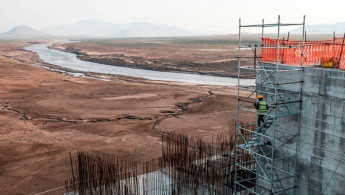Egypt to reject Ethiopia's unilateral decision on Nile dam as water levels drop in Sudan
Egypt said it will not accept a unilateral decision to fill and operate the controversial Grand Ethiopian Renaissance Dam (GERD), which is currently undergoing a second filling that Sudan claims has caused a 50% drop in water levels from the Blue Nile.
The Egyptian Minister of Irrigation and Water Resources, Mohamed Abdel-Ati, said on Friday that his country will reject any unilateral decision to fill and operate the largest hydroelectric project in Africa, which is estimated to cost of more than $4 billion USD.
Ethiopia officially informed Egypt on July 5 that it had started the second filling of GERD reservoir. Egypt remains eager to continue negotiations on GERD to reach a binding legal agreement that satisfies the desires of all parties involved, a solution that Ethiopia rejects.
Addis Ababa has also refused the involvement of third parties in the negotiations. Egypt and Sudan have requested that negotiations be led by the Democratic Republic of the Congo, with the active support of the United States, United Nations and European Union.
Members of the UN Security Council called on the three countries on July 8 to resume negotiations to reach a legal agreement on the dam.
Egypt and Sudan fear that the dam will reduce the availability of fresh water, which both countries rely on, with a dire impact on food security and the livelihoods of hundreds of thousands of people.
Sudan said on Saturday that the water supply from the Blue Nile continued to decrease by up to 50% as a result of the second filling of the dam.
The administration of the Roseires Dam, a dam upstream in the Sudanese stretch of the Blue Nile, issued warnings that "delayed resumption of (GERD) negotiations will endanger the Roseires dam".
The Sudanese Minister of Irrigation and Water Resources, Yasser Abbas, said the Ethiopian decision to start the second filling posed a threat to Sudan.
Abbas said Sudan has taken many measures to reduce the expected negative economic and social effects, but that it “will only mitigate some of the negative repercussions.”
Talks between Egypt, Ethiopia, and Sudan over the management of their shared water resources have stalled for years, with the three parties ultimately failing to reach any agreements.





 Follow the Middle East's top stories in English at The New Arab on Google News
Follow the Middle East's top stories in English at The New Arab on Google News
![Netanyahu furiously denounced the ICC [Getty]](/sites/default/files/styles/image_330x185/public/2024-11/GettyImages-2169352575.jpg?h=199d8c1f&itok=-vRiruf5)
![Both Hamas and the Palestinian Authority welcomed the ICC arrest warrants [Getty]](/sites/default/files/styles/image_330x185/public/2024-11/GettyImages-2178351173.jpg?h=199d8c1f&itok=TV858iVg)
